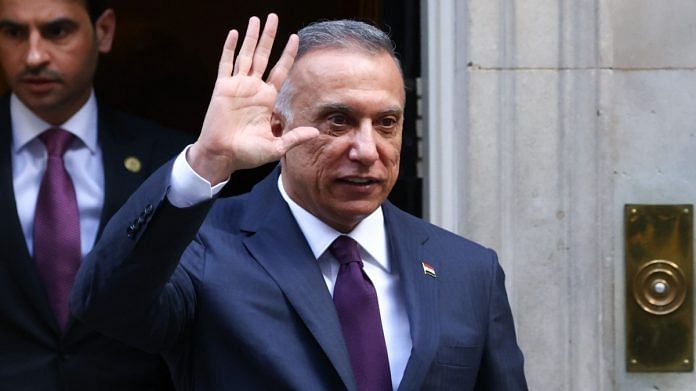Prime Minister Mustafa al-Kadhimi was fortunate to emerge from the early Sunday drone strike on his residence with just a light cut, covered by a bandage on his left wrist for his televised speech after the attack. But, despite his keep-calm-and-carry-on appeal, Kadhimi cannot conceal the grievous injury to the Iraqi body politic.
Nor should he try.
Since his appointment in May 2020, the prime minister has tried to conciliate the Iran-backed Shiite militias who bedevil Iraq’s fragile democratic system. Now, he must confront them and their masters in Tehran.
The brazen attempt on his life gives Kadhimi the justification to order a long-overdue crackdown on the militias. There can be little doubt that the attack was the handiwork of one of Iran’s catspaws: Among the many armed groups operating in Iraq, they alone have access to drones, supplied by the Islamic Republic to its proxies across the Arab world, from Lebanon to Yemen.
In Iraq, Shiite militias have used Iran-supplied drones to attack military bases housing U.S. personnel. They have also launched drone strikes deep into Saudi Arabia from Iraqi sites. But the prime minister, leery of antagonizing Tehran, has been loath to name-check the groups responsible for these attacks, and much less to condemn their suppliers.
If Kadhimi can now summon the courage to call out the culprits and their controllers, he can count on a powerful political weapon he has lacked until now: the support of his countrymen.
Iraqis have long since tired of Iran’s malign meddling and have been urging their political leadership to push back against Tehran’s proxies — groups like Kataib Hezbollah, Asaib Ahl Al Haq and the Badr Organization — that routinely terrorize citizens, extort money from businesses and murder rights activists. Kadhimi’s failure to curb their influence has contributed to the growing sense of despair among ordinary Iraqis, demonstrated in the poor turnout in last month’s general election.
There is frustration, too, within the Iraqi military, which is at risk of being supplanted by the militias. And there is mounting anxiety in other Arab capitals — and indeed in Washington — that Tehran is using these groups to call all the shots in Baghdad.
An astute politician might be able to channel the despair, frustration and anxiety into a concerted effort against their source. For Kadhimi, there is an additional impetus: The assassination attempt suggests the militias are no longer satisfied by his kowtowing and want him out of the way.
After the inconclusive results of the elections, Iran-backed groups have been trying to bully their way into power. They have questioned the legitimacy of the vote and have clashed with security forces outside Baghdad’s Green Zone.
Kadhimi, who didn’t himself stand for election, is hoping to keep his job on the strength of being the candidate least likely to offend the most parties. The militias know this, and apparently reckon that removing him from the equation will improve their chances of putting their own man in his seat.
In failing, the drone attack may have had the opposite effect, by underscoring Kadhimi’s credentials as a compromise candidate. After all, if the most detested organizations in the country are determined to do away with him, the other parties might just be inclined to rally to his cause.
The prime minister will need help from abroad, too. It will take an international effort to pressure Tehran into reining in its Iraqi proxies. The fact that Iran’s national security chief, Ali Shamkhani, felt compelled to deny responsibility for the assassination attempt suggests the regime he represents feels at least a degree of embarrassment, which gives other countries something to work with.
The Islamic Republic is keen to keep up its recent discussions — brokered, as it happens by Kadhimi — with its traditional enemies. The Arabs now have the opportunity to press the Iranians to curb their surrogates or at least stand back while the Iraqi military does the job.
If the prime minister can muster sufficient national and international support, there is just a chance he may be able to face down the militias without a shot being fired. More likely, there will be blood: The militias have Iranian weapons and training, after all. But the Iraqi military is more than capable of defeating them, having demonstrated their fighting skills against the Islamic State. It also has Western arms and training.
A confrontation is inevitable. Kadhimi’s hand may never be stronger than when it is still bandaged from the attempt on his life. –Bloomberg
Also read: As Syria begins normalising relations with neighbours, a look back at bloody 10-year conflict



